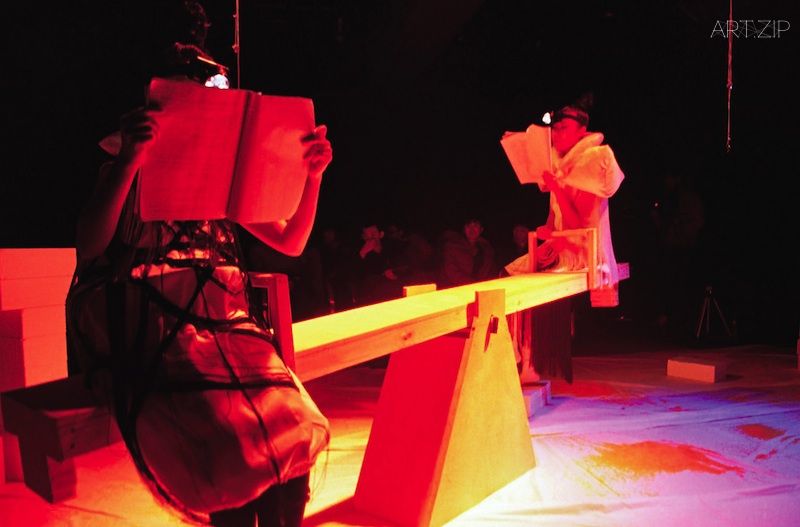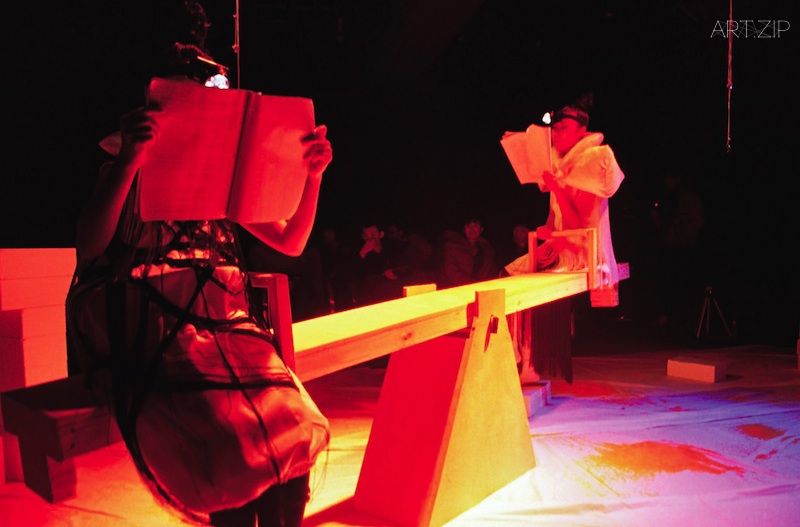
ART.ZIP:what do you think of the Chinese tradition, especially the literary and artistic tradition? Will you retrospect it and in what ways? As a Chinese artist, in your opinion, what advantages and disadvantages do you have? will the chaos and unpredictability in this rapidly changing country bring you inspiration or a kind of destruction?
Man: “Chinese tradition” is a dubious saying. I don’t know what “Chinese tradition” is, and I have doubt about this “tradition”, I doubt the existence of this so-called tradition. “tradition” should be a kind of “values” formed in the history and completely preserved in the continuation of history; if there is such kind of values, they have been interrupted for at least a century and already gone for a long time. If you are referring to the values conveyed by the Chinese classical literary and artistic works such as Kunqu opera, Beijing opera and A Dream of Red Mansions, I can only say that they probably are beautiful, but nowadays, they seem somewhat “hypocritical”, “affected”, “artificial” ── unreal and a bit “weak” ── and at a loss, like those classical paintings in the Louvre that are hanging high there and appreciated by passing tourists in a hasty manner, in face of the contemporary ── today’s reality, they feel nothing but powerless and are unable to explain it. Such values are too far away from the my experience in the present day, and cannot be converged at the level of both knowledge and experience. After the interruption of classical experience, new convincing mainstream values haven’t been formed yet in this country. I’m deeply suspicious of that kind of behavior of clamoring all the day for a cultural “dialogue” with the west; today, we even have no satisfactory mainstream values at all, whereby shall we have dialogue with others?! In fact, our country in today’s world is the “non-mainstream”; we are even not playing the same set of cards with them, whereby shall we have dialogue with them?! So, there is no this so-called “dialogue” at all. In a Postcolonial context, none of us are still “pure easterners”, for there have been no “purity”, the nationality has lost its sometime function of definition of and limitation on cultural attribute, and “we are all ‘westerners’” ── a kind of ‘different’ westerners”. Our “cultural clamor” is no more than a kind of “cultural lust”. So, I do not like to overemphasize my sense of identity as a Chinese artist in my works of art, neither will I do my work in this way. what I have to face is a globalized, capitalized, planarized, constantly alienated post-modern world that is full of mechanical reproduction and massive amounts of information ── and this is something unavoidable and always with us.
ART.ZIP:怎麼看待中國的傳統,尤其是文學藝 術上的傳統?你準備追溯嗎?以什麼方式?作為 中國藝術家,你覺得有什麼優勢和劣勢?這個 快速變化的國家的現狀會給你帶來靈感,或是 一種創作的摧毀?
Man: “中國的傳統”,這種說法是可疑的。我並 不清楚什麼是“中國的傳統”。並且我懷疑這個 “傳統”,懷疑這種所謂傳統的有無。“傳統”應該 是一種經過歷史形成的並在歷史的延續中比 較完整的保存下來的“價值觀”,如果真有這種 價值觀,那麼它至少斷裂了一個世紀了,早已經 不存在了,都過去了。如果你說的是崑曲、京劇 和《紅樓夢》等中國古典文藝作品中傳達的價 值觀,我只能說它可能是美的,但在今天會顯 得有些“矯情”、有些“做作”、有些“假”──不真 實,有些“虛弱”──無所適從,如同盧浮宮中被 束之高閣然後被不斷變換的旅遊者們走馬觀花 式瞻仰的那些古典繪畫,它們無力面對也無法 解釋當代──今天的現實。這種價值觀距離我 的當下經驗太遙遠,在知識和經驗層面無法對 接。在古典經驗斷裂之後,這個國家到現在並 沒有形成新的有說服力的主流價值觀。我對那 種成天叫嚷着要在文化上與西方“對話”的行為 深表懷疑,我們今天根本沒有能夠拿得出手的 主流價值觀,你憑什麼與人家對話?!實際上我 們這個國家在今天的世界上就是“非主流”,我們 與人家玩的都不是一套牌,你拿什麼與人家對 話?!所以根本就不存在這種所謂的“對話”。在 後殖民語境下,我們都已不是“純粹的東方人” , 早已沒有“純粹”,曾經的一紙國籍喪失了對於文 化屬性的定義與限制的功能,“我們都是‘西方 人’”──“一種‘不同的’的西方人”。我們的那些“ 文化叫嚷”不過是我們的一種“文化意淫”。所以 我不喜歡在藝術作品中過於強調中國藝術家的 身份感,我不會這樣做作品。我必須面對的是 一個已經全球化、資本化、平面化、媒介化、碎 片式、消除差異、機械複製、海量信息、不斷異 化的後現代世界──而這些才是每時每刻撲面 而來的,無可逃避無可遁形。


